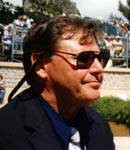


|
Alumni ProfileBehind Enemy LinesDuring the height of the Cold War, Walter “Scott” Berwick, BA’65 (R), served in the front lines or, more accurately, as a CIA intelligence officer he was often working behind enemy lines. In a 25-year career with the Central Intelligence Agency, Berwick operated clandestinely throughout the world, among other things, gathering information and tracking the movements of key Russians, Cubans and Chinese. He is certain his “contribution changed the course of history.” But don’t hold your breath waiting for more details, the ex-spook is not transparent when it comes to revealing national secrets. Now retired from the CIA, Berwick has moved on to another career equally important and often just as dangerous. He co-founded and is the executive director of BPA, Limited, an international crisis prevention and response company that specializes in resolving kidnapping-for-ransom cases. “There are few better feelings than seeing a kidnap victim released safe and sound after many months and, at times, yearsof captivity.” The firm, with offices in London, England, and South Florida, focuses on Latin America because, he says, that is where most kidnappings for ransom occur. Kidnapping and extortion “thrive in countries where corruption is endemic, where law enforcement agencies are ill equipped to cope and where corporate enterprise and prosperous families provide attractive targets for extortionists.” In a typical case, Berwick is notified of a kidnapping and immediately dispatches someone (often himself) to the country to organize the response and work with the family. “We try to calm the family down, prepare for each contact, determine the group responsible, learn the demands and negotiate the release.” The vast majority of cases are handled without incident, but things can and sometimes do go wrong. Like the time a helicopter pilot, at the last minute, refused to make a ransom drop in a guerrilla-controlled landing zone (Berwick had to cajole and finally threaten the pilot) or when a panicky and unauthorized rescue attempt by local authorities resulted in the murder of a hostage. And then there’s the increasingly more common problem of “double hits,” when kidnappers accept the ransom payment, but fail to release the prisoner and then ask for more money. Berwick’s career with the U.S. government has well equipped him for such action. He joined the CIA in 1965, after serving as a Navy submarine officer. “I was looking for an interesting job in the government, and I wanted to travel overseas.” He sure got his wish. During the next quarter century he served in seven countries in the Far East, Latin America and the Caribbean, including three tours as CIA chief of station, followed by stints in Washington, D.C., directing worldwide programs in counterterrorism and counterintelligence. |
|
|
“When I got up to go to work, I really looked forward to it. I thrived on the pressure,” he says. “It was a satisfying feeling to know that you are obtaining information that no one else can, and that you’re helping to provide policy makers with a clear picture.” Berwick believes the public’s most common misperception about the CIA is that it is a kind of “rogue elephant.” He says that orders for intelligence collection and covert actions come from above and that “the CIA has far more restrictions and oversight than any other U.S. government agency.” In 1990, Berwick retired from the CIA at the age of 49 with a rank equivalent to an Army general officer. “I take a measure of pride in the fact that we won the Cold War on my watch — and that was one of the reasons for my early retirement. Little did we know that the post-Cold War period would be fraught again with dangers and threats.” A former FDU senior-class president, as well as the captain of the basketball team, Berwick said his FDU education prepared him well to compete with highly skilled colleagues. “My educational and athletic experiences at FDU were absolutely top drawer. The education was superb, and professors the best. Imagine, English literature taught by a poet and novelist (Charles Angoff), Spanish by a Spanish nobleman (José Martel), history by a distinguished historian who had taught at Harvard (John Warren).” Berwick also recalls fondly a “feisty, extremely bright young professor who was as compassionate as she was competent, Helen Brudner [now professor of history and political science and associate director of the School of History, Political and International Studies].” It was Brudner who took Berwick’s contemporary history class to the New York World’s Fair in 1964, where he was greatly impressed by the exhibit on Winston Churchill. “In my opinion he was clearly the person of the century.” Berwick’s personal life has been just as fulfilling as his professional one. He is married with six adult children and lives in Key Largo, Fla., where he enjoys yachting, snorkeling and scuba diving, traveling, writing and playing tennis. He also is an officer in the U.S. Coast Guard Auxiliary. Berwick has come to believe that “measuring success is not nearly as difficult as we are led to believe — it is the difference between one’s origins and one’s final achievements.” While the book on Walt Berwick’s accomplishments may not be completely open, the conclusions point to nothing but success. — A.C. |
|
|
FDU Magazine Directory | Table of Contents | FDU Home Page | Alumni Home Page | Comments |
||